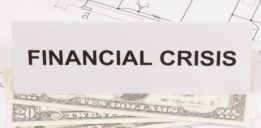3 Factors Suggest There Isn’t Much Economic Growth in the U.S.
We are told over and over that there’s economic growth in the U.S. economy. Listen to the politicians and they will tell you that they have fixed everything.
Here’s the thing: in times of prosperity, you want to see the standard of living improving and average individuals being happy financially. In the U.S., this is not the case; the average American is far from happy.
What we are seeing now (solid economic data and noise about economic growth) is nothing but an illusion. Underneath, things aren’t that great.
Here are three things you need to know:
1. Americans are mortgaging their future.
People in the U.S. are spending by borrowing more. This is not good for the long term. In the first quarter of 2019, household debt in the U.S. grew for the 19th consecutive quarter to $13.7 trillion. (Source: “Quarterly Report On Household Debt And Credit 2019: Q1 (Released May 2019),” Federal Reserve Bank of New York, last accessed August 9, 2019.)
2. U.S. incomes aren’t increasing fast enough.
The average hourly earnings of employees in the U.S. were $22.58 in 2010. In 2018, they were $27.10. (Source: “Average Hourly Earnings of All Employees: Total Private,” Federal Reserve Bank of St. Louis, last accessed August 9, 2019.)
That means hourly income grew by $4.52, or 20%, in a matter of eight years. Keep in mind that inflation in the U.S. economy during this period was more than 15.1%. So on a real basis, incomes grew by less than 4.7% during that eight-year period.
3. Americans don’t have emergency funds.
In times of economic growth, you would expect individuals to have higher savings. But according to a recent study by the Center for Retirement Research at Boston College, about 40% of American households would have trouble coming up with $400 in the case of an emergency. (Source: “Why Are So Many Households Unable to Cover a $400 Unexpected Expense?,” Center for Retirement Research at Boston College, last accessed August 9, 2019.)
How Will The Next Recession Play Out?
Dear reader, if what we’re experiencing now is economic growth, I’m not sure if I want to know what will happen to average Americans in the next recession that seems to be brewing.
These days, economic growth is being judged in the mainstream media by the performance of the stock market rather than by how average Americans are doing. Know this: not all Americans own or participate in the stock market, so they haven’t really enjoyed the gains we have seen in the past decade.
You must understand, if Americans are struggling, the U.S. economy won’t go far. American consumers are a major force behind the economy.
After the last financial crisis, America’s standard of living didn’t really get much better. Americans just borrowed more money and spent it.
I wonder what will happen if there’s a business slowdown in the U.S. and companies start to cut their labor force. Will average Americans default on their debts? Will they be able to bring food to their tables? There’s already a massive portion of the U.S. population using food stamps. Could they use skyrocket?






